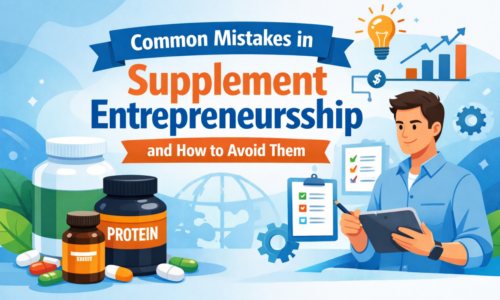
Amid today’s thriving health and wellness market, launching private-label nutritional supplements has become a popular choice for entrepreneurs and brands. However, rapid industry growth comes with increasingly stringent regulations. But did you know? Choosing a compliant supplement contract manufacturer is the cornerstone of ensuring your product reaches the market safely and smoothly—and ultimately succeeds. Non-compliant production can lead to risks such as product recalls, returns, and even financial penalties.
In this article, we’ll break down the key certifications and qualifications you should look for when selecting a dietary supplement contract manufacturer—in clear and simple terms.
Why Compliance Matters in Supplement Manufacturing
Compliance is not just about following procedures; it’s crucial for protecting brands and consumers. As consumers become increasingly health-conscious, regulations are becoming more stringent. A compliant contract manufacturer ensures:
- Product safety and authentic ingredients;
- Standardized processes with traceability for every batch;
- Avoiding being banned or removed from e-commerce platforms (such as Tmall Global and Amazon).
In other words, compliance is the cornerstone of brand reputation and consumer trust. This is an essential point to consider when choosing a contract manufacturer.
What Counts as a “Compliant Supplement Manufacturer”?
A compliant nutritional supplement manufacturer is far more than just possessing advanced production equipment. It must have a comprehensive and executable quality management system. This is reflected in:
Complete Traceability: The ability to record and track batches throughout the entire process, from raw material warehousing, production and processing, packaging, storage to shipment.
Standardized Operating Procedures (SOPs): Written standard procedures for every production stage, ensuring consistency and controllability in every production run.
Systematic Employee Training: All employees undergo rigorous pre-job training and continuous on-the-job training to understand and implement quality standards.
Key Certifications & Standards Every Brand Should Know
GMP Certification (Good Manufacturing Practice)
GMP certification is the most fundamental and essential production qualification in the dietary supplement manufacturing industry. It indicates that the factory’s production environment, equipment, processes, and quality control system meet the “Good Manufacturing Practice” standards, ensuring that the production process is stable, clean, controllable, and traceable.
Key Point: Always verify that the factory holds a GMP certificate issued by an authoritative third-party organization such as NSF, SGS, or UL, rather than merely claiming to operate according to GMP standards. A factory certified by a third-party GMP audit is significantly more reliable than one without external verification.
FDA Registration (Critical for the U.S. Market)
For brands targeting the U.S. market, FDA registration is a mandatory requirement.
Important Clarification: The U.S. FDA does not “approve” or “certify” dietary supplements themselves. Claims like “FDA-certified factory” are inaccurate. The correct process is that the manufacturing facility must be registered with the FDA and comply with current Good Manufacturing Practices (cGMP). The FDA may conduct inspections and audits on registered facilities.
Brand Risk Consideration: Choosing a factory that is FDA-registered and familiar with cGMP regulations is a prerequisite for legally entering the U.S. market.
ISO System Certification (ISO 9001 / ISO 22000)
ISO certification demonstrates that a factory meets international standards for quality management systems (ISO 9001) or food safety management systems (ISO 22000).
Value: While ISO certification does not specifically target dietary supplements, ISO-certified factories usually have stronger management processes, documentation control, and continuous improvement capabilities. This can be a powerful endorsement for brands looking to collaborate internationally or sell through cross-border e-commerce and major retail channels.
Third-Party Testing (COA Batch Reports)
Third-party testing is the final and critical step to verify product quality. Every batch should include a Certificate of Analysis (COA) issued by an independent laboratory.
Typical Testing Includes:
- Microbial limits
- Heavy metals (lead, arsenic, mercury, cadmium)
- Active ingredient content
- Screening for illegal or undeclared substances
Market Requirement: Most major e-commerce platforms, including Amazon and Tmall Global, require COA reports for listing certain product categories. Providing COA reports demonstrates that your brand is responsible and trustworthy.
Optional Certifications to Enhance Brand Value
Beyond mandatory certifications, certain additional certifications can differentiate your products and enhance pricing power:
- Organic Certifications (USDA Organic, EU Organic)
- Halal / Kosher Certification
- Gluten-Free, Vegan, Non-GMO Certifications
These certifications help you target specific consumer groups and strengthen your brand story, making your products more attractive in competitive markets.
Supplement Labeling & Claims: What Brands Must Avoid
Compliance doesn’t stop at production; it extends to labeling and advertising.
Prohibited Medical Claims
Under no circumstances may a product be claimed to “treat,” “cure,” or “prevent” any disease. This is a red line in global regulations.
Permitted Claims
Generally, only “structure/function claims” are permitted, describing how nutrients support the body’s normal structure and function. For example:
- “Calcium helps strengthen bones”
- “Supports a healthy immune system”
Essential Label Information
Mandatory information that must be on the label includes:
- Product Name
- Ingredient List (Supplement Facts/Nutrition Facts)
- Net Contents
- Directions for Use (Dosage)
- Warnings/Precautions
- Manufacturer/Distributor Name and Address
- Expiration Date (Best-by Date/Shelf Life)
Verifying Compliance: How to Assess Your Supplement Manufacturer
When selecting a manufacturing partner, brand owners should proactively request and verify the following documents to ensure product quality, compliance, and transparency:
| Document | Purpose / Verification |
| GMP Certificate | Confirm the issuing authority, certification scope, and validity period. Ensure it is issued by a recognized third-party organization (e.g., NSF, SGS, UL). |
| FDA Registration Number | Request a screenshot of the registration. Verify it through the FDA’s publicly available facility database. |
| Batch COA (Certificate of Analysis) | Check whether the third-party testing lab is reputable and whether the COA covers comprehensive tests (e.g., microbial limits, heavy metals, active ingredient content, illegal substances). |
| Production SOP or Quality Control Process Documentation | Assess the maturity and robustness of the factory’s quality management system. |
| Support for Third-Party Verification | Factories that allow brands to send samples for independent testing usually offer higher transparency and confidence in their production quality. |
Summary
Looking for a truly compliant supplement manufacturing partner and hoping to save time and costs on formulation innovation, private labeling, and small-batch pilot projects?
We offer comprehensive supplement manufacturing services, featuring GMP-standard production facilities and FDA-registered factory accreditation to support export and cross-border trade. Our solutions include batch-level COA testing for quality assurance, small-batch production, customized formulations, and full-service brand packaging and label design. Contact us today for a quote and sample proposals to launch your brand safely, compliantly, and efficiently!









